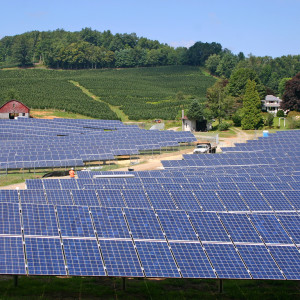It’s almost Halloween and things are looking a bit scary for the solar industry. The U.S. International Trade Commission (ITC), having decided earlier in the year that imports of solar panels manufactured overseas hurt domestic producers, will return to President Donald Trump with its recommended course of action. Industry groups are deeply concerned that the ITC will recommend protective tariffs which will decrease the overall growth of the industry. In a last minute attempt to sway the ITC’s decision, coalitions of businesses and public policy groups from a wide array of industries and perspectives are writing to the ITC urging restraint. The most recent came from the Business for Innovative Climate and Energy Policy (BICEP) network, a coalition of major companies advocating for stronger climate and clean energy policies.
“As major businesses in the U.S. economy, we oppose the recommendation of trade restrictions by the ITC that would increase costs and hinder U.S. deployment of solar energy,” writes Anne Kelly, senior director of policy at BICEP.
BICEP represents an array of companies who have made environmental policy a corporate focus. These include the natural foods brand Annie’s Inc. and outdoor equipment brand Patagonia, but also major companies like Kellogg, General Mills, Nestle, Nike, and eBay.
In the letter, the coalition of companies warned the ITC that imposing tariffs would harm both the American economy and the very solar industry they were intended to help. At present, the solar industry is experiencing rapid growth. Industry groups predict that over the next decade, employment in solar cell installation will grow faster than any other sector of the economy, including healthcare, as the numbers of workers in the industry doubles by 2026.
However, if tariffs increase the cost of solar cells and panels, installation numbers will likely fall. This has significant economic repercussions, since much of the job creation in the solar industry is tied to installation rather than production of solar panels. In the letter, BICEP says that while about 260,000 Americans work in the domestic solar industry, only about 2,000 of them work in manufacturing. If tariffs are put in place, they could end up sacrificing some of the installation jobs to save the manufacturing ones.
Even more than this, increasing prices would likely result in lower levels of adoption of the new technology.
“Beyond jobs in the industry itself, increased solar prices would hinder businesses’ and homeowners’ ability to purchase solar power,” BICEP wrote. “As companies committed to the use of renewable energy, we rely on the availability of solar infrastructure to achieve our sustainability goals.”
As U.S. companies are increasingly adopting clean energy goals, hamstringing the industry with new trade barriers could cut the rate of solar panel deployment by 50 percent. It would also increase the cost to taxpayers of federal subsidies for solar energy, since investment tax credits are granted as a percentage of total solar installation costs.
All in all, the businesses argue that tariffs would do little to help the industry and instead would slow progress towards a cleaner energy future.

